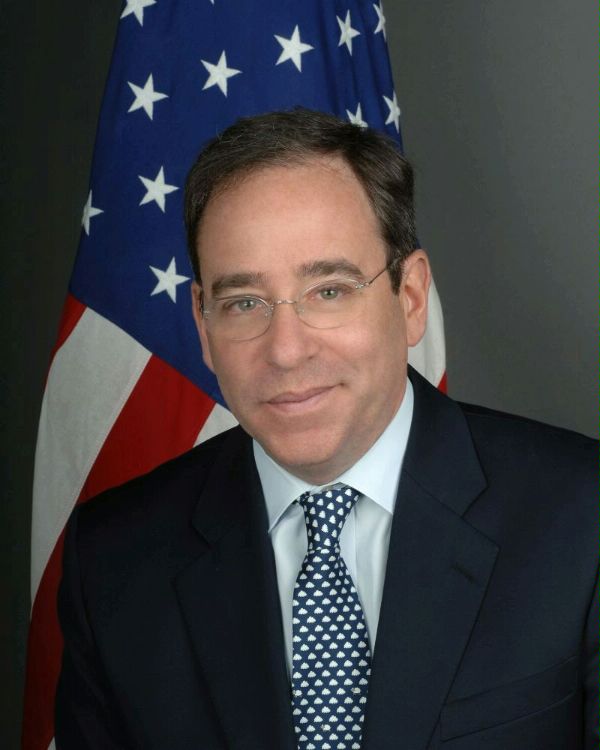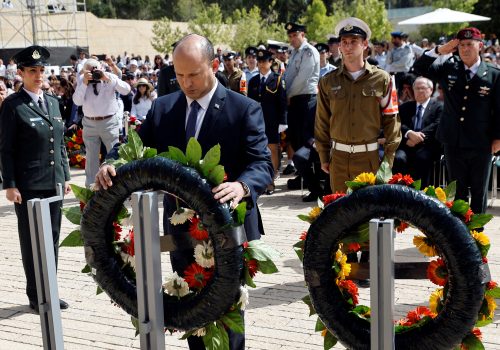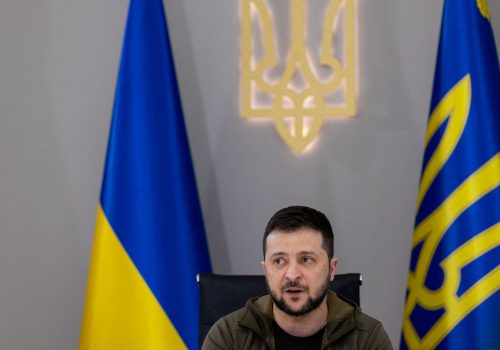‘Blessing in Movement’ – Private Roundtable with Esawi Frej
On March 31, the Atlantic Council’s Middle East Programs hosted a private roundtable with Esawi Frej, Israel’s Minister of Regional Cooperation. This event was moderated by William Wechsler, senior director of Atlantic Council’s Middle East programs, and attended by a number of think tank experts, US government officials and diplomats, and civil society representatives, all of whom are committed to preserving peace and stability in the region.
Opening Remarks
Minister Frej emphasized that the region is at a critical inflection point, and that the Abraham Accords have created sweeping winds of change toward tolerance and people-to-people understanding. After two years of divisions in Israel given the political impasse to form a government, the development of an ideologically diverse coalition has allowed for greater internal and regional cooperation. Moreover, the Abraham Accords have created the foundations for greater cooperation between other countries in the region and Israel and have the potential to create partnership between Israelis and Palestinians. Minister Frej focused on the benefits of the Abraham Accords, and how the Palestinian people can leverage the opportunities created by them.
Abraham Accords
The Minister stressed the importance of people-to-people activities as a way to ensure the Abraham Accords are sustainable. He also underlined that the Accords could grow further understanding between the people of the region. With this government, Israel has witnessed a visible shift toward greater people-to-people understanding and regional coordination in both economic and political terms. According to Minister Frej, prioritizing regional cooperation is the best way to create sustainable peace. However, peace cannot be achieved without the support of officials from the Palestinian territories. Describing the growing wave of regional activity inspired by the Accords, Minister Frej stressed the need for Palestinians to take advantage of the benefits presented by the new post-Accords reality in the Middle East.
He also emphasized that continued cooperation between governments is essential to achieving substantive change in the region, and specifically highlighted the support of the Egyptian and Saudi Arabian governments for future agreements involving the Palestinian territories. Minister Frej cited the N7 Conference, hosted by the Atlantic Council and the Jeffery M. Talpins Foundation last October, as a great example of the multilateral coordination and dialogue necessary to develop a foundation for governmental cooperation.
Furthermore, Minister Frej underscored the importance of using the word ‘normalization’ in a positive light. The term is often villainized in Arab media, and the narrative around the Abraham Accords and normalization efforts is largely negative. However, there can be no peace without normalization. The Abraham Accords are intended to drive momentum for peace, stability, and people-to-people understanding, which reflects his mission as Israel’s Minister of Regional Cooperation. In this momentum, the role of Arab Israeli citizens who share the same culture and language as the Arabs in the region is a true asset to the state of Israel.
Q&A Session
Addressing the recent wave of terrorist attacks in Israel, the government’s response and implications of the attacks on both the peace process and normalization efforts, Minister Frej offered a frank assessment. While it can be assumed that these attacks will continue to occur, they must be faced together and not allowed to succeed in dividing the country. These periods of instability are a wake-up call and reinforce the fact that the people are reliant on one another to survive and build sustainable relations to inhibit violence. To that end, Palestinian security must work alongside Israeli security forces to combat terrorist activity in the country.
Speaking on the path forward for Palestinians and other Arab countries to join the Abraham Accords, Minister Frej referred to Israel’s new coalition government. This coalition comprises individuals across the political spectrum and includes an Arab party. Though there is diversity in ideology, the ruling elite shares support for the Abraham Accords, as well as for greater economic development and education, as important values in their agenda. These values can be empowered by uplifting Palestinian civil society; if these civil societies are supported through a top-down structure, they can back people-to-people understanding, and aid in the growth of the Palestinian economy.
When asked if annexation of the West Bank was on the agenda in response to rising tensions and violence, Minister Frej emphasized that annexation goes against his beliefs. Keeping democracy strong is important, and differences in opinion are a product of democracy. For this coalition, annexation is off the table. He reminded the group that Israel’s democracy is still young and therefore fragile, and that this coalition was created to first and foremost protect democracy.
In building off questions regarding reactions in the Arab world to the Abraham Accords and mechanisms by which to build relationships with critical countries, such as Jordan, Egypt, and Saudi Arabia, Minister Frej offered a regional approach to peacebuilding. The more countries that are involved in normalization, the more effective and sustainable the peace process will be. The Accords are now at a critical juncture, and what it takes for more countries in the Arab world to join is the genuine support of the Palestinians. He reminded the panel that there are Palestinian refugees across the Arab world, where public opinion is greatly influenced by the fate of these refugees.
Finally, he asserted that all dealings between countries must be transparent, and that having the courage to work together publicly is the first step in developing long term relationships for a peaceful transition and creating the foundation for people-to-people understanding.
Salwa Balla, is a Young Global Professional with the Rafik Hariri and Middle East Programs.
Further reading
Thu, Apr 28, 2022
Israel’s PM gave a Holocaust Remembrance speech without mentioning Iran. It signals a new approach.
MENASource By Daniel B. Shapiro
Naftali Bennett signals confidence that Israel will be vigilant and strong. That confidence grows out of more than just a different philosophical approach.
Wed, Apr 13, 2022
Israel won’t stick out its neck for Ukraine. It’s because of Russia.
MENASource By David Daoud
Over the last decade, regional developments have forced Israel to balance its moral sense regarding the Russia-Ukraine conflict against its vital national interests.
Wed, Apr 6, 2022
Zelenskyy wants Ukraine to be ‘a big Israel.’ Here’s a road map.
New Atlanticist By Daniel B. Shapiro
By adapting their mindset to mirror aspects of Israel’s approach to security challenges, Ukrainian officials can tackle their own critical challenges with confidence.



